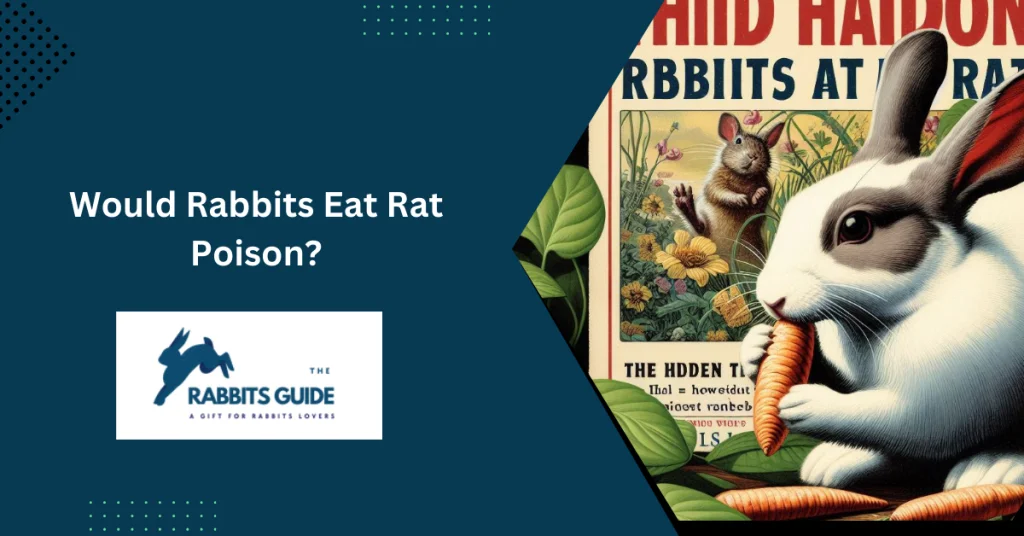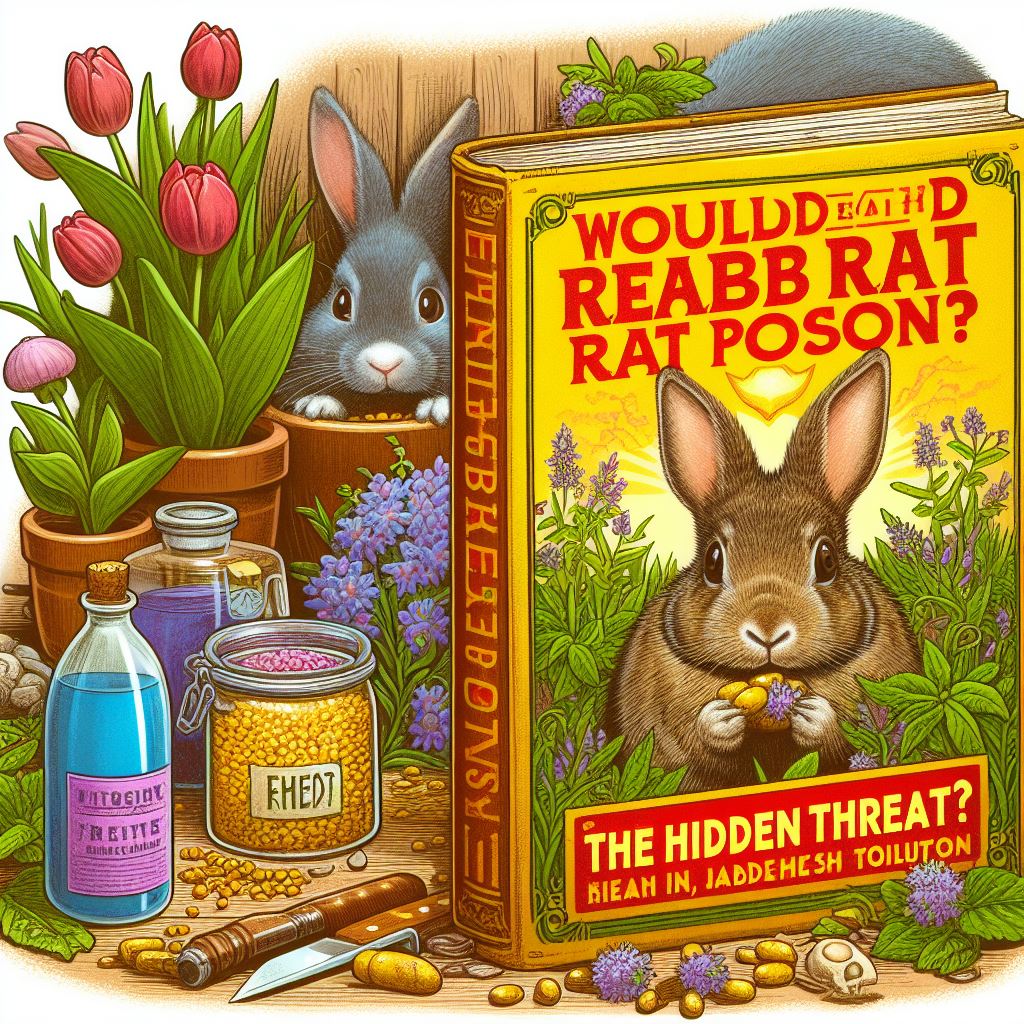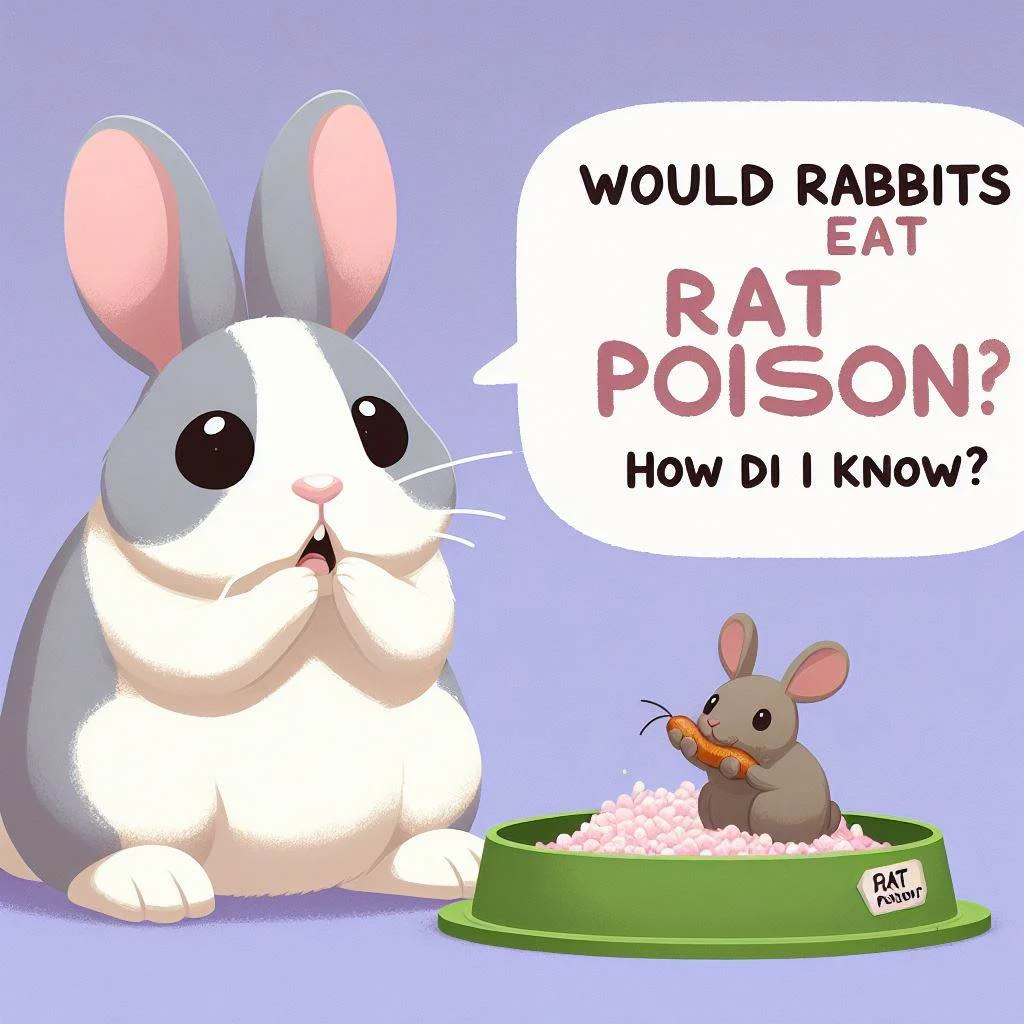Explore the hidden threat of ”Would rabbits eat rat poison?” Uncover the risks and learn why it’s crucial to safeguard your furry companions from accidental exposure.
Introduction
In the world of caring for our fluffy friends, we often wonder, “Would rabbits eat rat poison?” This concern uncovers a potential danger that needs our attention. Even though rabbits usually munch on greens, the risk of accidental encounters with rat poison exists.
In this guide, we share the most recent and helpful information to keep your bunnies safe. Discovering the hidden threat is crucial for responsible pet ownership. Learn about the unique aspects of rabbit behavior that make them susceptible to this danger. With simple, user-friendly insights, you can stay ahead, ensuring a secure environment for your beloved rabbits.

Would Rabbits Eat Rat Poison?
To discuss the circumstances in which rabbits would eat rat poison, we have to understand their behavior and the factors leading to unintentional exposure.
Explore the Herbivorous Nature of Rabbits
Rabbits are cute and furry creatures known for their herbivorous diet, meaning they primarily eat plants. In the wild, their meals consist of grasses, leaves, and vegetables. Domesticated rabbits also enjoy a similar diet, munching on hay, fresh veggies, and specially formulated rabbit pellets.
These furry friends have a unique digestive system designed for processing tough plant fibers. Their teeth never stop growing, which helps them grind down the constant wear from chewing on fibrous vegetation.
Factors Leading to Unintentional Exposure to Rat Poison
While rabbits may seem like invincible herbivores, they can face risks if accidentally exposed to rat poison. Here are some factors to be aware of
Misplaced Poison
Sometimes, people put out rat poison to control pests, unaware that curious rabbits might come across it. It’s crucial to place rat poison in areas inaccessible to rabbits.
Secondary Poisoning
Rabbits might nibble on plants or objects contaminated with rat poison, leading to secondary poisoning. Ensuring a rabbit-safe environment is key to preventing such incidents.
Storage and Accessibility
Improperly stored rat poison can pose a threat to rabbits. Ensure it’s securely stored and far from areas where your rabbit can reach.

Types of Rat Poison-Unveiling the Risks for Rabbits
Overview of Common Rat Poisons and Their Potential Toxicity
Rat poisons, often known as rodenticides, come in various types, each with its own set of active ingredients. Two main categories are anticoagulant and non-anticoagulant poisons.
Anticoagulants like brodifacoum and bromadiolone, interfere with blood clotting, while non-anticoagulants, such as bromethalin, affect the nervous system. These substances are designed to be potent against rodents but can be equally dangerous to unintended targets, including our herbivorous friends, rabbits.
Understanding the Threat to Rabbits
The potential toxicity of rat poison to rabbits lies in their sensitivity to the active ingredients. Even a small amount can lead to severe health issues. Anticoagulant poisons, for example, may cause internal bleeding, while non-anticoagulants can result in nervous system dysfunction.
Rabbits may encounter these substances while foraging or exploring areas where rat poison has been placed. To protect our fluffy companions, it’s crucial to be aware of the types of rat poison used in and around our homes and gardens and take preventative measures to ensure they remain out of reach for the safety of our herbivorous friends.
Health Risks of Rat Poison Ingestion in Rabbits
Internal Bleeding
Rat poison contains anticoagulants that can lead to severe internal bleeding in rabbits.Blood clotting mechanisms are disrupted, causing uncontrolled bleeding.
Organ Damage
Poisoned rabbits may suffer damage to vital organs, including the liver and kidneys. Toxic compounds in the rat poison can lead to organ failure.
Neurological Issues
Some rat poisons affect the nervous system, leading to neurological problems in rabbits. Symptoms may include seizures, tremors, and difficulty in coordination.
Anemia
The anticoagulant properties of rat poison can result in anemia in rabbits. Reduced red blood cells impact oxygen transport, leading to weakness and lethargy.
Digestive Distress
Ingesting rat poison can cause gastrointestinal issues in rabbits. Symptoms include vomiting, diarrhea, and abdominal pain.

Importance of Prompt Veterinary Attention
Early Detection Saves Lives
Rapid identification of rat poison ingestion is crucial for effective treatment. Swift action can prevent or minimize the severity of health issues.
Specialized Treatment
Veterinary attention ensures the administration of appropriate antidotes or treatments. Specialized care helps counteract the effects of the poison on the rabbit’s system.
Monitoring and Support
Veterinarians can monitor the rabbit’s condition closely. Supportive care, such as fluid therapy, can aid in flushing out toxins.
Prevention of Complications
Timely veterinary intervention reduces the risk of complications. Proactive measures can prevent the progression of organ damage or bleeding.
Expert Guidance for Recovery
Veterinarians provide guidance on post-treatment care and recovery. Follow-up appointments ensure the rabbit’s well-being and long-term health.

Prevention and Safety Measures: Safeguarding Your Rabbits
Practical Tips to Prevent Access to Rat Poison
Keeping our furry friends safe means taking steps to prevent them from accessing harmful rat poison. First, ensure rat poison containers are elevated and secured on high surfaces, out of reach for your curious rabbits. Opt for pet-safe alternatives that effectively control rodents without posing risks to your pets. Secure outdoor spaces with fencing to limit rabbit access to areas where rat poison might be present. Regularly monitor their surroundings for any signs of potential danger, and promptly address any issues to create a secure environment.
Suggest Alternative, Pet-Safe Methods for Rodent Control
When it comes to keeping rodents at bay without endangering your rabbits, consider alternative, pet-safe methods. Natural repellents like peppermint oil or vinegar can effectively deter rodents without harming your pets. Explore electronic traps designed specifically for rodents, ensuring the safety of your furry companions. Identify and seal entry points that rodents may use to access areas where your rabbits roam, creating a secure space for them. By incorporating these user-friendly and pet-safe alternatives, you can effectively control rodents while prioritizing the safety and well-being of your beloved rabbits. Also using gloves while touching rodents or doing pest control is recommended.

Would Rabbits Eat Rat Poison? How Do I know?
Symptoms of Rat Poison Ingestion
Rabbits, being curious creatures, may encounter hazards like rat poison, and recognizing signs of poisoning is crucial for their well-being. If you notice any of the following symptoms, it’s essential to act promptly and seek veterinary help.
Lethargy
If your rabbit is unusually tired or lacks energy, it could be a sign of poisoning.
Loss of Appetite
A sudden disinterest in food may indicate poisoning. Observe changes in eating habits.
Difficulty Breathing
Labored breathing or shortness of breath can be a serious symptom requiring immediate attention.
Weakness
Noticeable weakness, especially difficulty standing or moving, could signal poisoning.
Uncoordinated Movements
If your rabbit displays unsteady or shaky movements, it may be a sign of poisoning affecting the nervous system.
Blood in Urine or Feces
Any presence of blood in urine or feces is a significant red flag and warrants urgent veterinary attention.
Vigilance is key to early detection. If you observe any of these signs, don’t hesitate to seek immediate veterinary help. Acting promptly increases the chances of a positive outcome for your rabbit.
Can rat poison be fatal for rabbits?
Yes, rat poison can be fatal for rabbits if not addressed promptly. Internal bleeding, neurological complications, and cardiovascular issues pose severe threats. Seeking immediate veterinary attention increases the chances of a successful recovery.
Which bunnies are more at risk for rat poisoning?
All rabbits are vulnerable, but those with access to areas where rat poison is used, or those prone to exploring, are at higher risk. Young, elderly, or weakened rabbits may be more susceptible to the toxic effects of rat poison.
What can you do to minimize the risk of rat poisoning?
Minimize the risk by opting for non-toxic pest control methods. Secure rat poison in inaccessible locations, regularly inspect the environment for potential hazards, and create rabbit-safe zones. These measures reduce the chances of accidental ingestion.

What foods and plants can kill a rabbit?
Toxic food
Avoid feeding rabbits foods like chocolate, caffeine, onions, garlic, and iceberg lettuce, as they can be harmful. Always provide a balanced diet of hay, fresh veggies, and rabbit pellets.
Toxic Plants
Certain plants like azaleas, rhubarb, and foxglove are toxic to rabbits. Familiarize yourself with rabbit-safe plants and remove any potentially harmful ones from their environment.
What is the treatment for rat poisoning in rabbits?
Treatment involves decontamination, supportive care, and specific antidotes depending on the type of rat poison ingested. Immediate veterinary attention is crucial for tailoring an effective treatment plan and improving the rabbit’s chances of recovery.
How long does it take for rabbits to exhibit symptoms of rat poisoning?
The onset of symptoms can vary, typically appearing within a few hours to days after ingestion. Immediate symptoms like lethargy may be followed by more severe indications such as neurological or respiratory issues. Early detection is key, so monitor your rabbit closely.
How is rat poisoning diagnosed in rabbits?
Veterinarians use a combination of physical examinations, blood tests, and a detailed history to diagnose rat poisoning in rabbits. Blood clotting tests are particularly informative. Quick veterinary assessment is crucial to confirm the poisoning and determine the appropriate treatment.
How does rat poison affect a rabbit’s body?
Rat poison interferes with blood clotting mechanisms, leading to internal bleeding. Certain types, like bromethalin, affect the nervous system, causing brain swelling. Calcium channel blockers in other poisons disrupt the cardiovascular system. Understanding these effects helps in tailoring treatment plans.
Conclusion
In the exploration of whether rabbits would eat rat poison, we’ve unveiled a hidden threat that underscores the importance of responsible pet ownership. While rabbits are herbivores by nature, the risks of unintentional exposure to rat poison loom large. As conscientious caretakers, it is our duty to be proactive in creating a safe environment for our beloved furry companions.
Understanding the potential health risks, types of rat poison, and the signs of ingestion empowers us to take preventative measures. Elevating rat poison out of reach, opting for pet-safe alternatives, and monitoring our rabbits’ surroundings are practical steps to mitigate the hidden threat. In times of crisis, recognizing the symptoms and seeking immediate veterinary attention can make all the difference.
